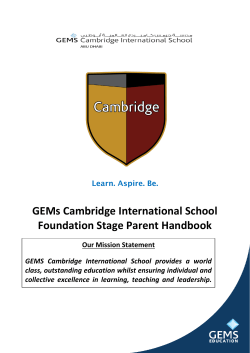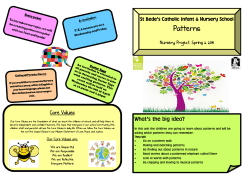
Parents’ Guide to the Early Years Foundation Stage (EYFS) Framework
Parents’ Guide to the Early Years Foundation Stage (EYFS) Framework What is the Early Years Foundation Stage? Welcome to the Early Years Foundation Stage (EYFS), which is how the Government and early years professionals describe the time in your child’s life between birth and age 5. The EYFS sets standards that all early years providers must meet to ensure that children learn and develop well and are kept healthy and safe. It promotes teaching and learning to ensure children's 'school readiness' and gives children the broad range of knowledge and skills that provide the right foundation for good future progress through school and life. This is a very important stage as it helps your child get ready for school as well as preparing them for their future learning and successes. From when your child is born up until the age of 5 their early years experience should be happy, active, exciting, fun and secure; and support their development, care and learning needs. Nurseries, pre-schools, reception classes and childminders registered to deliver the EYFS must follow a legal document called the Early Years Foundation Stage Framework. What is the EYFS Framework – why do we have one? The EYFS Framework exists to support all professionals working in the EYFS and was developed with a number of early years experts and parents. In 2012 the Framework was revised to make it clearer and easier to use, with more focus on the things that matter most. This new framework also has a greater emphasis on your role in helping your child develop. It sets out: • The legal welfare requirements that everyone registered to look after children must follow to keep your child safe and promote their welfare • The 7 areas of learning and development which guide professionals’ engagement with your child’s play and activities as they learn new skills and knowledge • Assessments that will tell you about your child’s progress through the EYFS • Expected levels that your child should reach at age 5, usually the end of the reception year; these expectations are called the “Early Learning Goals (ELGs)” There is also guidance for the professionals supporting your child on planning the learning activities, and observing and assessing what and how your child is learning and developing. What does it mean for me as a parent? Ensuring my child’s safety Much thought has been given to making sure that your child is as safe as possible. Within the EYFS there is a set of welfare standards that everyone must follow. These include the numbers of staff required in a nursery, how many children a childminder can look after, and things like administering medicines and carrying out risk assessments. How my child will be learning The EYFS Framework explains how and what your child will be learning to support their healthy development. Your child will be learning skills, acquiring new knowledge and demonstrating their understanding through 7 areas of learning and development. Children should mostly develop the 3 prime areas first. These are: • Communication and language; • Physical development; and • Personal, social and emotional development. These prime areas are those most essential for your child’s healthy development and future learning. As children grow, the prime areas will help them to develop skills in 4 specific areas. These are: • Literacy; • Mathematics; • Understanding the world; and • Expressive arts and design. Each area of learning is broken up into an aspect which informs our planning and informs individual development and learning as you will see from the table below; Area of Learning and Development Aspect Prime Areas Personal, Social and Emotional Development Physical Development Communication and Language Making relationships Self-confidence and self-awareness Managing feelings and behaviour Moving and handling Health and self-care Listening and attention Understanding Speaking Specific Areas Literacy Mathematics Reading W riting Num bers Understanding the World Expressive Arts and Design Shape, space and m easure People and com m unities The world Technology Exploring and using m edia and m aterials Being im aginative These 7 areas are used to plan your child’s learning and activities. The practitioners teaching and supporting your child will make sure that the activities are suited to your child’s unique needs. This is a little bit like a curriculum in primary and secondary schools, but it's suitable for very young children, and it's designed to be really flexible so that practitioners can follow your child's unique needs and interests. Children in the EYFS learn by playing and exploring, being active, and through creative and critical thinking which takes place both indoors and outside. Observation, assessment and planning will continue in the same way and each practitioner will be responsible of collating information to input into each individuals child’s “Learning Journey”. Area of The diagram below gives examples of the areas of learning and development and shows the links between the way in which your child learns and what they learn. For example, between 2 ½ and 4 years: learning to be confident in talking to other children when playing, and to talk freely about own home and community For example, between 2 ½ and 4 years: learning how to explore what happens when they mix colours For example, in reading between 2 ¼ and 4 years: learning how to suggest an ending to a story For example, between 1 ¾ and 2 ½ years: developing an understanding of simple concepts such as big/little For example, between 1 ¼ and 2 years: enjoying filling and emptying containers in the bath For example, between 3 ¼ and 5 years: learning to control objects by pushing, patting, throwing, catching or kicking For example, between 2 ¼ and 3 ¾ years: learning about special times or events for family or friends and being able to describe them. Being able to talk about some of the things they have observed such as plants, animals, natural and found objects. As a mum or dad, how can I help with my child’s learning? All the fun activities that you do with your child at home are important in supporting their learning and development, and have a really long lasting effect on your child’s learning as they progress through school. Even when your child is very young and is not yet able to talk, talking to them helps them to learn and understand new words and ideas. If you make the time every day to do some of the following things with your child it will make a real difference to your child’s confidence as a young learner. Talk about the numbers, colours, words and letters you see when you are out and about Sing and tell nursery rhymes On a trip to the supermarket, talk about all the different packaging shapes Allow your child to cut out and stick pictures from magazines Cook / bake together Plant seeds or bulbs in a pot or garden patch Talk to your child at every opportunity – e.g. what you are doing that day Use the weather – shadows, rain puddles, snow, wind, mist and sun – to extend your child’s vocabulary Share a book Explore the park at a different time of the year – go off the beaten track If you're looking for new ideas for things to do then find out what is on offer at your local children’s centre. Many offer ‘messy play’ activities which you and your child can join in with, and many of the activities they provide are free. You will find a timetable of activities within our entrance hall or contact the Children’s Centre direct on 01270 375 390 How can I find out how my child is getting on? It is important that you and the practitioners within the nursery caring for your child work together. You need to feel comfortable about exchanging information and discussing things that will benefit your child. These conversations will need to be with your child’s “key person”. This is the person who: • Is your main point of contact within the setting • Helps your child to become settled, happy and safe • Is responsible for your child’s care, development and learning • Takes a careful note of your child’s progress, sharing this with you and giving you ideas as to how to help your child at home You are welcome to view and contribute to your child’s learning journey at any time and there are two stages (at age 2, and again at age 5) when our practitioners caring for your child will give you written information about how he or she is doing. Try to speak to your child’s key person as often as possible about what your child has been doing, what they have enjoyed, what they need to be doing more of and what you can do at home. When your child is 2 When your child is 2½, the keyperson and room senior will request an informal meeting to discuss and give you a written summary of how your child is progressing against the 3 prime areas of learning: • communication and language; • physical development; and • personal, social and emotional development. This is called the progress check at age 2. This check will highlight areas where your child is progressing well and any where they might need some extra help or support – and how mums and dads and other family members or carers can work with the key person to help. You might find it useful to share the information from the check with other professionals such as health visitors (who can use it as part of the health and development review). When your child is 5 At the end of the EYFS – in the summer term of the reception year in school – teachers complete an assessment which is known as the EYFS Profile. This assessment is carried out by the reception teacher and is based on what they, and other staff caring for your child, have observed over a period of time. Another important part of the EYFS Profile is your knowledge about your child’s learning and development, so do let your child’s class teacher know about what your child does with you: such as how confident your child is in writing their name, reading and talking about a favourite book, speaking to people your child is not so familiar with or their understanding of numbers. All of the information collected is used to judge how your child is doing in the 7 areas of learning and development. Finding out at this stage how your child is doing will mean that the teacher your child has in their next school year – year 1 – will know what your child really enjoys doing and does well, as well as helping them decide if your child needs a bit of extra support, what that support should be and if they are already getting it. The school will give you a report of your child’s progress, including information from his or her EYFS Profile. Where can I go for further information? The most important place to find out more is here at Sunflowers – do ask as many questions as you need to. Practitioners really do welcome speaking with you. You may want to find out what is on offer at your local Children’s Centre. You can find the Early Years Foundation Stage which includes the early learning goals at www.foundationyears.org.uk. The foundation years website also includes a range of resources and contacts.
© Copyright 2025















